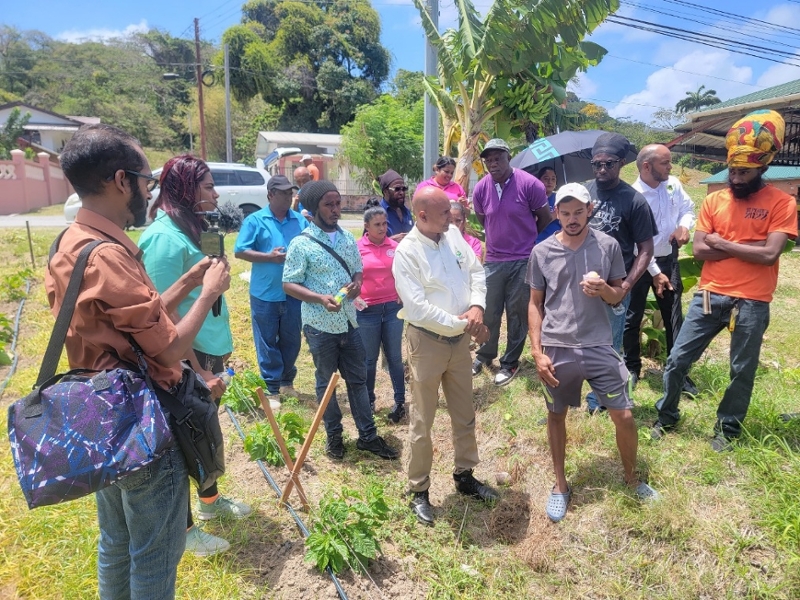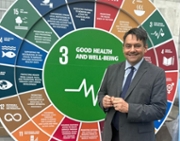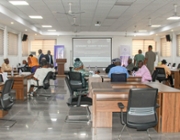Climate smart farming in Trinidad and Tobago

08 April 2025
Agriculture is a major pillar of Caribbean food security, nutrition and human health, but with climate change impacts such as flooding, droughts and periods of extreme heat, the sector will require robust science to inform farming practices. The Commonwealth Local Government Forum has been working with partners to address this situation.
Knowledge through practice
The MarVista Institute for Agriculture, Training and Development (MIATD) of Trinidad and Tobago on 24 and 25 March 2025 delivered a comprehensive training package at an intense two-day workshop, which included site visits to local farms, to engage farmers in the knowledge of climate change science and adaptation through practice. The training event drew farmers from the Mayaro-Rio Claro Region which is a rich food basket for the south-east part of Trinidad. MIATD issued certificates to the participants at the end of the training. Funding for the workshop was provided by the European Union, through CLGF. Opening remarks from Alderman Raymond Cozier Chairman of the Mayaro-Rio Claro Regional Corporation were well received by the farming community.
Ready, responsive and resilient
The MarVista Institute for Agriculture, Training and Development highlighted the need for farmers to be aware of how to be ready, responsive, and resilient to climate change, using available science and local knowledge. The workshop was conducted through lectures and site visits to farms where farmers gave firsthand accounts of how they were planting crops to cope with flooding, drought and heat stress.
Specialists delivering the training sessions included Professor Michelle Mycoo - climate scientist of the Intergovernmental Panel on Climate Change and Professor of Urban and Regional Planning, The University of the West Indies, St. Augustine, Professor Wayne Ganpat - former Dean of the Faculty of Agriculture, The University of the West Indies, St. Augustine, Mr. Potter Bruno - Crop and Irrigation Specialist of the Tobago House of Assembly and Mr. Marcus Mycoo - Agronomist and Chairman of MIATD, complemented by his experienced team of MIATD practitioners.
Urgent action by farmers
Professor Mycoo highlighted that the planet is facing stress resulting from unprecedented large quantities of greenhouse gases mainly from fossil fuels and that no part of the world has been spared from extreme events such as record-breaking temperatures, drought, excessive rainfall and flooding. She noted these climate change impacts were being felt across Africa, Asia, Europe, the Pacific and the Americas. Professor Mycoo emphasised that the main climate change impacts which exacerbated Caribbean islands’ vulnerability were higher-than-average temperatures, heat stress, drought, floods, hurricanes and storms, and to a lesser extent sea level rise. Her key message was that the time had come for local farmers to urgently act by embracing scientific knowledge and cutting-edge technologies to become resilient in coping with climate change. Professor Mycoo assured farmers being trained in the workshop that the international scientific community was working at a fast speed to develop adaptation technologies to cope with climate change. She gave examples of climate change adaptation technologies being employed by the agricultural sector around the world which included drones, mobile apps, and geographic information systems to facilitate community mapping and underscored that local training in their use is essential.
The adoption of water management techniques and nature-based solutions were also highlighted to ensure national water and food security and as she underscored “No water means no food”.
Adaptive practices
Professor Ganpat focused his presentation on the specific impacts of unusual events on production. Intense heat, floods and drought erode farmers’ incomes drastically. As such, modern, innovative farming practices must be urgently adopted by farmers. Professor Ganpat then introduced a wide range of adaptive practices that are available for possible adoption by farmers in the south-western region of Trinidad. He encouraged farmers to embrace some of these sustainable practices and environmentally-friendly technologies presently available for use.
Marcus Mycoo encouraged the local farmers to embrace proven technologies to manage crops through extremes of flood, drought and heat. He also focused on simple techniques such as improved nursery management and the use of earlier root dominant transplants as a method to help plants become more drought tolerant. He emphasised collectively, all these approaches to crop production can improve productivity levels, reduce farmers’ expenses and increase their income. Mr. Mycoo and his team conveyed to farmers the success they had on farms in Rio Claro with the application of technologies that helped manage crop stress due to heavy continuous rain, drought and extreme heat. Improved crop growth, pest and disease management, and higher yields all in an environmentally friendly manner were all demonstrated in their systems approach. He noted that a revolution was taking place in agriculture with better scientific knowledge in how to cope with climate change impacts and farmers needed to be climate smart, ready, rooted and resilient.
Role of water
Potter Bruno emphasised the role of water in crop production and encouraged farmers to move towards the use of drip irrigation and its associated technologies such as timer control, soil moisture sensors and fertigation, as they together reduce weeds, pest and disease incidence and labour costs. He discussed the major components of a drip irrigation system and highlighted the role that proper drainage practices play in maintaining crop health, thereby increasing yield and ultimately increasing profitability. Mr. Bruno concluded that adopting the above practices can contribute to providing food that is safe for human consumption, while at the same time making the farm more climate resilient.
Effective training leading to sustainable farming
The training workshop received very positive feedback from the participants. One farmer stated: “I was well informed and well educated to make sure my investment in agriculture is successful”. Other farmers noted: “the training was very helpful and informative; the information was very clear and easy to understand…the experience was great”. Another farmer stated that the MIATD staff and trainers were extremely professional, helpful in answering questions, easy to understand, and overall, it was a pleasant learning experience”. One farmer liked “the scientific references and that the training gave a sense of hope”. Some farmers expressed the need for more training workshops in courses on specific crop production.
Farmers are key to human survival and targeted training is geared to making farmers ready, responsive and resilient to climate change. The MIATD training focused on transformation of farming to enhance national and local food security, sustainable livelihoods and income generating opportunities for farmers who are a key cornerstone in the battle against climate change impacts on Small Island Developing States. Farming can be revolutionised by farmers up-taking training and being rooted in climate smart agricultural practices.
Back to News





